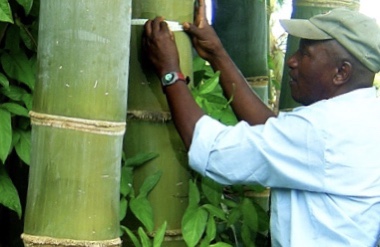There are no products in your shopping cart.
| 0 Items | £0.00 |


By Ayo Akinfe
[1] As we enter December and begin to prepare for Xmas, can we please spare a thought for our mono-economy of a nation. One does not need to be a genius to realise that you simply cannot sustain 200m people being wholly dependent on one source of government revenue. At the moment, crude oil exports account for over 90% of government income, fetching the treasury between $25bn and $50bn annually depending on global petroleum prices. Now, do you know that bamboo alone can match that if we exploited the sector?
[2] In India for instance, their demand for bamboo totals 30m tonnes a year and is expected to grow significantly. So, the Indian government decided to establish the National Bamboo Mission, which in turn set up the Cane and Bamboo Technology Centre, whoser mission is to develop a bamboo value chain for improved livelihood
[3] Even in Kenya, the government plans to construct 500,000 housing units using bamboo and other related agricultural waste materials by 2030. It is part of a plan to move away from sub-standard housing such as mud huts
[4] In China, there are about 10m bamboo farmers and the industry creates over 35m jobs in the construction, housing, furniture and utensils industry. If you want to see innovation, go to China and see how they are using bamboo to manufacture toilet paper and paper towels
[5] Globally, the bamboo market is said to be worth about $70bn at the moment and this figure is rising as producers keep coming up with innovative ways of using the plant for new things. In these days of eco-friendly buildings, bamboo is used to construct green hotels and even stadia
[6] Globally, over 1bn persons live in shelters made from bamboo, mostly in Asia. The housing sector is responsible for about one third of global greenhouse gas emissions and consumes some 40% of global resources. Using bamboo in building and construction would eventually minimise this major challenge. In addition, it will also access to housing more affordable. I ask why none of the housing commissioners in any of Nigeria's 36 states have even tried a pilot project. Maybe they could start with a small housing estate of say 50 homes to see how it will go
[7] According to the Raw Materials Research and Development Council in Abuja, Ogun, Oyo, Osun, Ondo, Edo, Delta, Rivers, Akwa-Ibom, Cross-River, Abia, Ebonyi, Enugu, Anambra and
Imo states are awash with bamboo. In these states, at least 10% of the natural vegetation is dominated by bamboo with existing clumps showing appreciable gregarious growth that is contiguous over large areas
[8] For me, the challenge is simple. If you are from any of these main producing states, please pressurise your commissioner for trade and industry to woo processors. He should get both foreign and local investors to open processing plants in the state. In addition, your commissioner for housing should offer building contracts to one or two property developers to build a few housing units made of bamboo for low income earners
[9] Over the long term, if we want to make serious revenue from bamboo, we have to tap into the global furniture market. Why is Nigeria not awash with furniture factories making sofas, beds, chairs, tables, cabinets, cupboards, etc out of bamboo?
[10] Maybe one area we could enjoy real growth is in the sanitary towel and tissue paper industry. Come to think of it, if condoms are manufactured and given away for free, why are sanitary towels not free too? It is not as if a woman has any choice in the matter. What stops Nigeria becoming to first country to give out free sanitary towels to all females between the ages of say 12 and 25? If they are made cheaply from local bamboo, this should be possible. Who is our minister for women's affairs again?